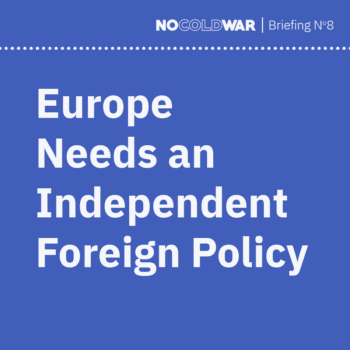Dear friends,
Greetings from the desk of Tricontinental: Institute for Social Research.
It is difficult to make sense of many events these days. France’s behaviour, for instance, is hard to square. On the one hand, French President Emmanuel Macron changed his mind to support Ukraine’s entry into the North Atlantic Treaty Organisation (NATO). On the other hand, he said that France would like to attend the BRICS (Brazil, Russia, India, China, and South Africa) summit in South Africa in August. Europe is, of course, not an entirely homogeneous continent, with problems afoot as Hungary and Turkey have refused to ratify Sweden’s desire to enter NATO at its annual summit in Vilnius (Lithuania) in July. Nonetheless, the European bourgeoisie looks westward to Wall Street’s investment firms to park its wealth, yoking its own future to the regency of the United States. Europe is firmly wedded to the Atlantic alliance with little room for an independent European voice.
 At the No Cold War platform, we have been carefully studying these elements of Europe’s foreign policy. Briefing no. 8, which will form the bulk of this newsletter, has been drafted along with European Parliament member Marc Botenga of the Workers’ Party of Belgium, or PTB—PVDA. You will find it below.
At the No Cold War platform, we have been carefully studying these elements of Europe’s foreign policy. Briefing no. 8, which will form the bulk of this newsletter, has been drafted along with European Parliament member Marc Botenga of the Workers’ Party of Belgium, or PTB—PVDA. You will find it below.
The war in Ukraine has been accompanied by a strengthening of the US’s grip and influence on Europe. An important supply of Russian gas was replaced by U.S. shale gas. European Union (EU) programmes originally designed to fortify Europe’s industrial base now serve the acquisition of U.S.-made weapons. Under U.S. pressure, many European countries have contributed to escalating war in Ukraine instead of pushing for a political solution to bring about peace.
At the same time, the U.S. wants Europe to decouple from China, which would further reduce Europe’s global role and run counter to its own interests. Instead of following the U.S.’s confrontational and damaging New Cold War agenda, it is in the interests of Europe’s people for their countries to establish an independent foreign policy that embraces global cooperation and a diverse set of international relations.
Europe’s Growing Dependence on the US
The Ukraine war, and the ensuing spiral of sanctions and counter sanctions, led to a rapid decoupling of EU-Russia trade relations. Losing a trade partner has limited the EU’s options and increased dependence on the U.S., a reality that is most visible in the EU’s energy policy. As a result of the war in Ukraine, Europe reduced its dependence on Russian gas, only to increase its dependence on more expensive U.S. liquefied natural gas (LNG). The U.S. took advantage of this energy crisis, selling its LNG to Europe at prices well above production cost. In 2022, the U.S. accounted for more than half of the LNG imported into Europe. This gives the U.S. additional power to pressure EU leaders: if U.S. shipments of LNG were diverted elsewhere, Europe would immediately face great economic and social difficulty.

Reza Derakhshani (Iran), White Hunt, 2019.
Washington has started pushing European companies to relocate to the U.S., using lower energy prices as an argument. As German Minister for Economic Affairs and Climate Action Robert Habeck said, the U.S. is ‘hoovering up investments from Europe’—i.e., it is actively promoting the region’s deindustrialisation.
The U.S. Inflation Reduction Act (2022) and the CHIPS and Science Act (2022) directly serve this purpose, offering $370 billion and $52 billion in subsidies, respectively, to attract clean energy and semiconductor industries to the U.S. The impact of these measures is already being felt in Europe: Tesla is reportedly discussing relocating its battery construction project from Germany to the U.S., and Volkswagen paused a planned battery plant in Eastern Europe, instead moving forward with its first North American electric battery plant in Canada, where it is eligible to receive U.S. subsides.
EU dependence on the U.S. also applies in other areas. A 2013 report by the French Senate asked unambiguously: ‘Is the European Union a colony of the digital world?’. The 2018 U.S. Clarifying Lawful Overseas Use of Data (CLOUD) Act and the 1978 U.S. Foreign Intelligence Surveillance Act (FISA) allow U.S. companies extensive access to EU telecommunications including data and phone calls, giving them access to state secrets. The EU is being spied on continuously.
Rising Militarisation Is Against the Interests of Europe

Clément Jacques-Vossen (Belgium), Lockdown, 2020.
EU discussions on strategic vulnerabilities focus mostly on China and Russia while the influence of the U.S. is all but ignored. The U.S. operates a massive network of over 200 U.S. military bases and 60,000 troops in Europe, and, through NATO, it imposes ‘complementarity’ on European defence actions, meaning that European members of the alliance can act together with the U.S. but not independently of it. Former U.S. Secretary of State Madeleine Albright famously summarised this as ‘the three Ds’: no ‘de-linking’ European decision-making from NATO, no ‘duplicating’ NATO’s efforts, no ‘discriminating’ against NATO’s non-EU members. Furthermore, in order to guarantee dependence, the U.S. refrains from sharing the most important military technologies with European countries, including much of the data and software connected to the F-35 fighter jets they purchased.
For many years, the U.S. has been calling for European governments to increase their military spending. In 2022, military spending in Western and Central Europe surged to €316 billion, returning to levels not seen since the end of the first Cold War. In addition, European states and EU institutions sent over €25 billion in military aid to Ukraine. Prior to the war, Germany, Britain, and France were already amongst the top ten highest military spenders in the world. Now, Germany has approved €100 billion for a special military upgrading fund and committed to spend 2% of its GDP on defence. Meanwhile, Britain announced its ambition to increase its military spending from 2.2% to 2.5% of its GDP and France announced that it will increase its military spending to around €60 billion by 2030—approximately double its 2017 allocation.

Georgi Baev (Bulgaria), Name, 1985.
This surge in military spending is taking place while Europe experiences its worst cost of living crisis in decades and the climate crisis deepens. Across Europe, millions of people have taken to the streets in protest. The hundreds of billions of euros being spent on the military should instead be redirected to tackling these urgent problems.
Decoupling from China Would Be Disastrous
The EU would suffer from a U.S.-China conflict. A significant part of EU exports to the U.S. contains Chinese inputs, and conversely, EU goods exports to China often contain U.S. inputs. Tighter export controls imposed by the U.S. on exports to China or vice versa will therefore hit EU companies, but the impact will go much further.
The U.S. has increased pressure on a variety of EU countries, companies, and institutions to scale down or stop cooperation with Chinese projects, in particular lobbying for Europe to join its tech war against China. This pressure has borne fruit, with ten EU states having restricted or banned the Chinese technology company Huawei from their 5G networks as Germany considers a similar measure. Meanwhile, the Netherlands has blocked exports of chip-making machinery to China by the key Dutch semiconductor company ASML.
In 2020, China overtook the U.S.’s position as the EU’s main trading partner, and in 2022, China was the EU’s largest source for imported goods and its third largest market for exported goods. The U.S. push for European companies to restrict or end relations with China would mean limiting Europe’s trade options, and incidentally increasing its dependence on Washington. This would be detrimental not just to the EU’s autonomy, but also to regional social and economic conditions.
Europe Should Embrace Global Cooperation, Not Confrontation

Aida Mahmudova (Azerbaijan), Non-Imagined Perspectives, 2018.
Since the end of the Second World War, no single foreign power has wielded more power over European policy than the U.S. If Europe allows itself to be locked into a U.S.-led bloc, not only will this reinforce its technological dependence on the U.S., but the region could become de-industrialised. Moreover, this will put Europe at odds not only with China, but also with other major developing countries, including India, Brazil, and South Africa, that refuse to align themselves with one country or another.
Rather than follow the U.S. into conflicts around the world, an independent Europe must redirect its security strategy towards territorial defence, collective security for the continent, and building constructive international links by decisively breaking away from paternalistic and exploitative trade relations with developing countries. Instead, fair, respectful, and equal relationships with the Global South can offer Europe the necessary and valuable diversification of political and economic partners that it urgently needs.
An independent and interconnected Europe is in the interests of the European people. This would allow vast resources to be diverted away from military spending and towards addressing the climate and cost of living crises, such as by building a green industrial base. The European people have every reason to support the development of an independent foreign policy that rejects U.S. dominance and militarisation in favour of embracing international cooperation and a more democratic world order.
The No Cold War briefing above asks an important question: is an independent European foreign policy possible? The general conclusion, given the balance of forces that prevail in Europe today, is no. Not even the far-right government in Italy, which campaigned against NATO, could withstand pressure from Washington. But, as the briefing suggests, the negative impact of the Western policy of preventing peace in Ukraine is being felt daily by the European public. Will the European people stand up for their sovereignty or will they continue to be the frontline for Washington’s ambitions?
Warmly,
Vijay

